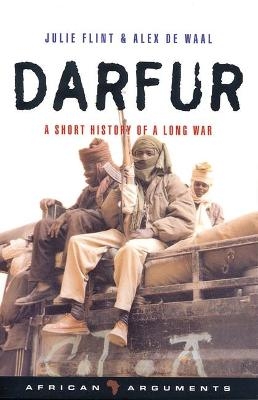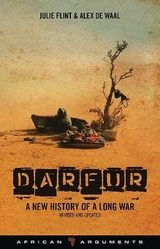
Darfur
Zed Books Ltd (Verlag)
978-1-84277-696-4 (ISBN)
- Titel erscheint in neuer Auflage
- Artikel merken
Sudan's westernmost region, Darfur, sprang from oblivion into sudden notoriety early in 2004, when a war of hideous proportions unleashed what the United Nations called 'the world's worst humanitarian crisis' and the United States labelled 'genocide.' For the last two years, the conflict has been simplified to pictures of immense sprawling refugee camps and lurid accounts of 'Arabs' murdering 'Africans.'
Behind these images lies a complex and fascinating story of a unique and remote region of Africa, home to Muslim peoples with a unique history. In the 20th century, Darfur became synonymous with poverty and neglect, culminating in famine and a series of undeclared and unacknowledged wars in the 1980s and '90s. This book details the history of Darfur, its conflicts, and the designs on the region by the governments in Khartoum and Tripoli.
Much of the story of the war in Darfur has remained untold until now. This book investigates the identity of the infamous 'Janjawiid' militia, tracing its origins, organization and ideology. It inquires into the nature of the insurrection launched by two rebel groups, the radical Sudan Liberation Army and the more Islamist-oriented Justice and Equality Movement. It charts the unfolding crisis and the confused international response, including the African Union's first major venture into peacemaking and peacekeeping. The book concludes by asking what the future holds in store for Darfur.
Alex de Waal is a writer and activist on African issues. He is a fellow of the Global Equity Initiative, Harvard; Director of the Social Science Research Council program on AIDS and social transformation; and a director of Justice Africa in London. In his twenty-year career, he has studied the social, political and health dimensions of famine, war, genocide and the HIV/AIDS epidemic, especially in the Horn of Africa and the Great Lakes. He has been at the forefront of mobilizing African and international responses to these problems. His books include, Famine that Kills: Darfur Sudan (2004), Famine Crimes: Politics and the Disaster Relief Industry in Africa (1997) and Islamism and Its Enemies in the Horn of Africa (2004). Julie Flint is a journalist and film-maker who divides her time between London and the Middle East. In a thirty-year career, she has worked on four continents, from Colombia to China, and won awards for newspapers, radio and television. She has been writing about Sudan since 1992, initially as Horn of Africa correspondent for the Guardian and later as a freelance with a special interest in human rights. She has written extensively on the Nuba of Sudan, the oil war in southern Sudan and, most recently, Darfur. Her work includes Sudan's Secret War (1995), The Scorched Earth (2000) and Darfur Destroyed (2004).
Preface
1. The People of Darfur
Dor Village
A History of Statehood and Ethnicity
Islam in Darfur
Becoming Sudanese
2. The Government of Sudan
3. The Janjawiid
Musa Hilal, A Big Sheikh
Roots of the Northern Janjawiid
The Death of the Old Order
The Arab Gathering
The Masalit War: 'The beginning of the organization of the Janjawiid'
From Aamo to Misteriha
4. The Rebels
The Fur Resistance
The Zaghawa Link
When Did the Insurrection Begin?
Looking for Friends
Search for a Cohesive Leadership
The Justice and Equality Movement
From The Black Book to Guerrilla Operations
5. The War
6. Endgame
Forward to the Past
The UN and the Genocide Question
Bibliography
Index
| Reihe/Serie | African Arguments |
|---|---|
| Zusatzinfo | Black and white photographs; 22 Illustrations |
| Sprache | englisch |
| Themenwelt | Geschichte ► Allgemeine Geschichte ► Zeitgeschichte |
| Geisteswissenschaften ► Geschichte ► Regional- / Ländergeschichte | |
| ISBN-10 | 1-84277-696-7 / 1842776967 |
| ISBN-13 | 978-1-84277-696-4 / 9781842776964 |
| Zustand | Neuware |
| Haben Sie eine Frage zum Produkt? |
aus dem Bereich



